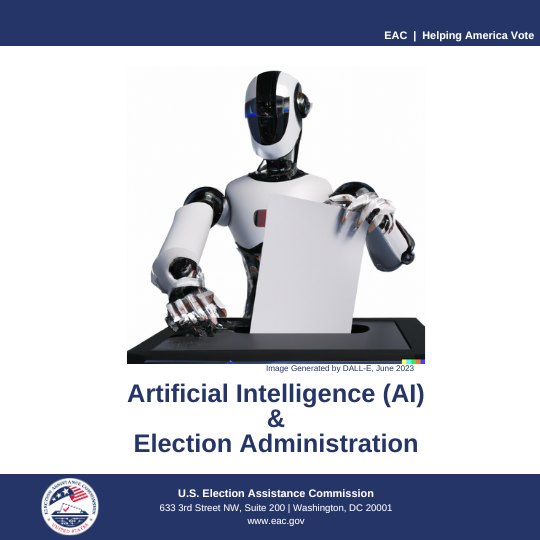What is Artificial Intelligence (AI)?
According to IBM, “…artificial intelligence is a field, which combines computer science and robust datasets, to enable problem-solving.” Based on large enough datasets, personal assistants like Siri and Alexa can understand voice commands and respond appropriately (most of the time). Other tools, from thermostats to robotic vacuums, use artificial intelligence to know when to run household appliances.
AI and Elections
AI-powered tools have become much more widely available and capable in recent years. They have the potential to benefit society and election offices but can also accelerate false or biased information and undermine fair elections if used inappropriately. While these tools do not necessarily introduce new cybersecurity risks, AI tools may allow existing threats to scale more quickly and effectively. AI-generated text can dramatically increase the success rate of phishing emails and other social engineering attacks. According to the Cybersecurity and Infrastructure Security Agency (CISA), these types of attacks can deceive victims into providing their login credentials or installing malicious software. State and local election officials should also be aware that text, images, video, and audio content may be used to imitate themselves or other official sources of information. Additionally, AI is becoming more prevalent within applications used by voters to find information, whether they are aware or not, either through AI-enhanced search or productivity tools. AI-generated information may seem plausible, but it is often inaccurate. This lack of accuracy may be particularly harmful to voters. Critical voting information, such as voting dates, hours, and locations, require a higher degree of accuracy than many AI tools can currently provide.
Cybersecurity and Election Administration: Artificial Intelligence and Elections
View the Cybersecurity and Election Administration Video Series
AI Resources
Emerging Technology, AI, and Elections
What can election officials do now in the midst of the 2024 election season about threats from AI and other emerging technologies?
That is a central question in addressing the use and misuse of artificial intelligence and its associated tools. While AI can be a helpful tool, there have already been incidents where it has been used to mislead or confuse voters.
EAC Chairman Ben Hovland interviewed Ginny Badanes from Microsoft’s Democracy Forward program on AI’s impact on the election landscape and tools for election officials. The Democracy Forward initiative works to support democracies around the world through cyber-protection, civic engagement, and other methods by utilizing lessons learned from cyber-threats, influence operations, and AI use in U.S. and international elections. There are ongoing and developing efforts to try to lessen the impact of AI misuse and weaponization.
AI Toolkit
Like any technology, AI tools are used for a variety of purposes—good, bad, and neutral. The purpose of this document is to provide election officials with a general understanding of AI tools, and the opportunities and threats that they create for effective election administration. The AI Handout Template (Canva log-in required) is available for election officials to create a printed handout that can be distributed at offices, libraries, and events to direct voters to official sources of important election information.
This document includes:
- An overview of existing AI tools;
- A Strengths, Weaknesses, Opportunities, and Threats (SWOT) analysis of these tools in the field of election administration;
- Communications Tips and Best Practices for Navigating AI-generated Content;
- A handout template that election officials can use to direct voters and constituents to verifiable sources of accurate information.
Cybersecurity: Artificial Intelligence
The 60-Second Security Series is intended to help election officials quickly identify, and address, potential security issues. Each topic includes a brief description, a list of security measures, and potential funding sources for making these improvements. This document is meant to provide practical and useful resources to election officials to counter information security and cybersecurity threats related to AI in the context of election administration.
HAVA Guidance, Policies & Advisories
The U.S. Election Assistance Commission (EAC) developed the documents below to identify the agency's approach to Artificial Intelligence (AI). The agency's Compliance Plan and Use Case Inventory satisfy the reporting requirements included in OMB Memo M-24-10. Additionally, the Commissioners of the EAC voted unanimously to approve the use of Election Security grants authorized by the Help America Vote Act to counter disinformation generated through the use of AI. A link to the full policy can be found below. For additional information, please contact [email protected].


